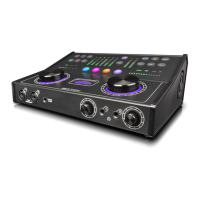MBOX Control Software Overview
35
Hardware Outputs can be controlled from their fader strip controls (Trim, Volume, Mute, when available), and from the Monitor sec-
tion. The following are available from output fader strips.
Main, Alt and Bluetooth Output levels can be controlled by the Monitor knob, or from the
Vol knob in their fader strip. If Monitor Link
is enabled, the Main, Alt and Bluetooth output levels all follow the Monitor knob and show the same levels. If you need to adjust an in-
dividual output (Main, or Alt, or Bluetooth) use their fader strip
Trim knobs, or unlink the outputs.
Preferences
Preferences let you optimize MBOX hardware and MBOX Control settings.
Clocking Options
(Sample Rate and Clock Source)
Clocking Options let you set the MBOX Sample Rate, and choose a Clock Source.
* Sample rates of 88.2 kHz and above affect some MBOX capabilities. For example, Loopback is not available at 176.4 and 192 kHz.
Buffer Size (Windows Only)
The Buffer Size (Hardware Buffer Size) on Windows controls the size of the buffer used to handle host processing tasks such as pro-
cessing with host-based, or “Native” plug-ins. Use low HW Buffer settings for audio recording (low latency). Use high buffer settings
for mixing and plug-in processing (high latency).
Hardware Output Controls
Item Description
Trim
Adjusts (trims) volume level for Main, Alt, and Bluetooth outputs so that they all have the same audible loudness. This is most
useful for speaker calibration and level matching when Main/Alt/BT levels are linked, or when they are not linked.
Volume Adjusts the overall hardware output level of a given output channel.
Mute Silences the output.
Right
Offset
Lets you level balance the left and right outputs separately on supported outputs. On Main or Alt, right-click the Trim knob to
access Right Offset.
Preferences on Mac (at left) and WIndows (at right
MBOX Clocking Options
Item Description
Sample Rate MBOX supports 44.1, 48, 88.2, 96, 176.4, and 192 kHz.*
Clock Source Choose an available clock source: Internal, S/PDIF, or ADAT.

